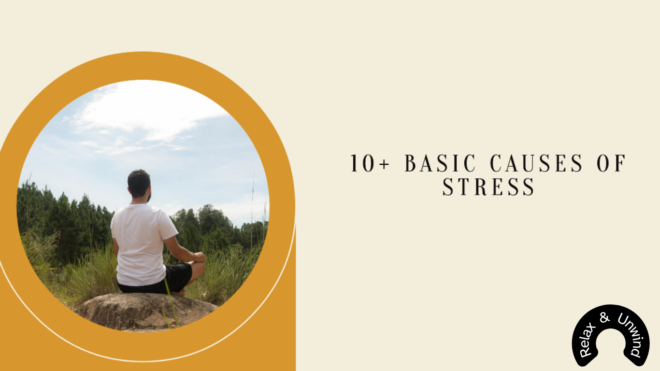Table of Contents
Understanding Stress:
Stress is a physiological and psychological response to a perceived threat or challenge. It is the body’s natural reaction to situations that require adaptation or response. While stress is a normal part of life and can serve as a motivating factor, chronic or excessive stress can have negative effects on both physical and mental well-being. This article explores the causes of stress.
Stressors can be categorized into 2 different Types:
Acute Stress: Short-term stress that arises from immediate challenges or demands.
Chronic Stress: Persistent, long-term stress that results from ongoing challenges, such as work-related pressures.
Symptoms of Stress:
Stress can manifest in various ways, and its symptoms can affect both the body and the mind. It’s important to recognize these symptoms early on to address stress effectively. Here are common symptoms of stress:
Physical Symptoms:
Muscle Tension: Feeling tightness or stiffness in muscles, especially in the neck, shoulders, or back.
Headaches: Tension headaches or migraines can be triggered or exacerbated by stress.
Fatigue: Feeling tired, even after a full night’s sleep, due to the physical and emotional toll of stress.
Sleep Disturbances: Difficulty falling asleep, staying asleep, or experiencing restful sleep.
Digestive Issues: Upset stomach, indigestion, nausea, or changes in bowel habits.
Chest Pain: Stress can contribute to chest pain or discomfort, which may be mistaken for heart issues.
Changes in Appetite: Stress can lead to overeating or loss of appetite, resulting in weight gain or loss.
Emotional and Behavioral Symptoms:
Irritability: Feeling easily annoyed, agitated, or having a short temper.
Anxiety: Experiencing heightened worry, nervousness, or restlessness.
Depression: Feeling sad, hopeless, or experiencing a loss of interest in previously enjoyable activities.
Mood Swings: Rapid shifts in emotions, from irritability to sadness or anger.
Difficulty Concentrating: Trouble focusing, making decisions, or completing tasks.
Memory Issues: Forgetfulness or difficulty recalling information.
Cognitive Symptoms:
Racing Thoughts: Persistent, fast-paced thoughts that may be overwhelming.
Worrying: Excessive worry about future events or potential negative outcomes.
Negative Self-talk: Engaging in self-critical or pessimistic thoughts.
Inability to Relax: Difficulty winding down or experiencing a constant sense of tension.
Other Symptoms:
Increased Substance Use: Turning to substances such as alcohol, nicotine, or drugs as a coping mechanism.
Weakened Immune System: Increased susceptibility to illnesses due to the suppressive effects of stress on the immune system.
It’s important to note that stress symptoms can vary among individuals, and some people may experience a combination of these symptoms.
Major Causes of Stress:
Stress can be caused by a variety of factors, and what may be stressful for one person may not be for another. Stressors, or triggers of stress, can be classified into different categories, encompassing various aspects of life. Here are common causes of stress:
Major Life Events:
The life events that are the major causes of stress are:
- Marriage or relationship issues
- Divorce or separation
- Birth of a child
- Death of a loved one
- Job loss or career changes
Work-related Stressors:
The work related causes of stress includes:
- Heavy workload
- Tight deadlines
- Job insecurity
- Conflicts with colleagues or supervisors
- Lack of control over work
Financial Stressors:
The financial causes of stress are:
- Debt
- Economic instability
- Unemployment or financial insecurity
- Unexpected expenses
Relationship Issues:
The relationship issues leads to causes of stress are:
- Family conflicts
- Friendships or social conflicts
- Romantic relationship challenges
- Breakups or divorces
Health-related Stressors:
- Diagnosis of a serious illness
- Chronic health conditions
- Ongoing health concerns for oneself or a loved one
- Physical injuries
Academic Stress:
Academic causes of stress includes:
- Exams and academic pressure
- Competition and performance expectations
- Adjusting to a new educational environment
Daily Hassles:
- Traffic or commuting difficulties
- Time pressures
- Household chores and responsibilities
- Minor conflicts or irritations
Environmental Stressors:
- Natural disasters (e.g., earthquakes, hurricanes)
- Pollution
- Noise
- Disruptions in routine due to external factors
Uncertainty and Ambiguity:
- Uncertain future
- Lack of clarity in life goals
- Ambiguous or unpredictable situations
Social and Cultural Factors:
- Social pressures and expectations
- Cultural norms and societal standards
- Discrimination or prejudice
- Trying to meet external expectations
Traumatic Events:
- Accidents
- Violence or abuse
- Natural disasters
- Traumatic incidents experienced or witnessed
Overstimulation:
- Information overload
- Exposure to bright lights, loud noises, or excessive stimuli
- Technological or sensory overload
Personal Expectations:
- Unrealistic personal expectations
- Fear of failure or falling short of personal standards
- Perfectionism
Parenting:
Parents of children with behavior disorders and developmental delays have the highest risk for parenting stress. In fact, numerous studies show parents of children with autism are reporting higher levels of parenting stress than people whose children do not have the condition.
These situations can lead to varying levels of stress, and individual responses depend on factors such as coping mechanisms, resilience, and support systems. Recognizing and managing stress involves identifying specific stressors, developing effective coping strategies, and seeking support when needed. It’s also important to adopt healthy lifestyle practices to build resilience and better navigate challenging situations.
Certain Other Factors that Leads to Stress:
The experience of stress is highly individual and can be influenced by a combination of internal and external factors. What causes stress for one person may not have the same effect on another. Several factors contribute to why certain things make you feel stressed:
Perception and Appraisal: Your perception and interpretation of events play a crucial role. The way you perceive a situation, your beliefs, and your expectations can influence whether you see it as a stressor.
Individual Differences: People have different tolerances for stress, and what might be manageable for one person could be overwhelming for another. Personal resilience, coping skills, and previous experiences can shape your response to stressors.
Coping Mechanisms: Your repertoire of coping mechanisms and strategies to deal with stress can impact how you respond to challenging situations. Effective coping mechanisms can mitigate stress, while less adaptive ones may contribute to increased stress.
Past Experiences: Previous experiences, especially traumatic or challenging ones, can influence how you react to similar situations in the future. Past stressors may create sensitivities or trigger responses in certain contexts.
Expectations and Goals: When there’s a perceived discrepancy between your expectations or goals and the reality of a situation, it can lead to stress. Unrealistic expectations or the fear of falling short of goals can contribute to stress.
Lack of Control: Feeling a lack of control over a situation or the inability to influence outcomes can be a significant source of stress. The perception of control or agency can influence stress levels.
Uncertainty: Ambiguity and uncertainty about the future or the outcome of a situation can contribute to stress. The unknown can create anxiety and discomfort.
Social and Cultural Factors: Social pressures, cultural expectations, and societal norms can influence your stress response. Trying to meet or conform to external expectations may contribute to stress.
Physical Well-being: Physical factors such as lack of sleep, poor nutrition, or health issues can impact your overall resilience and increase susceptibility to stress.
Life Circumstances: Major life events or ongoing life circumstances, such as financial difficulties, relationship issues, or work-related challenges, can be significant stressors.
Environmental Factors: Your physical environment, including noise, lighting, and exposure to stimuli, can contribute to stress. Overstimulation or discomfort in your surroundings may affect your stress levels.
Understanding why certain things make you feel stressed involves self-awareness and reflection. Identifying the specific factors contributing to stress can empower you to develop effective coping strategies and make positive changes in your life. Seeking support from friends, family, or mental health professionals can also be beneficial in managing stress and building resilience.
How Stress Effect the Health?
Chronic or persistent stress can have significant effects on both mental and physical health. The body’s stress response, designed to deal with immediate threats, can become problematic when activated for extended periods. Here are some of the potential effects of chronic stress on health:
- Hypertension (High Blood Pressure)
- Heart Diseases
- Weakened Immune Response
- Gastrointestinal Issues
- Weight Gain
- Insulin Resistance
- Menstrual Irregularities
- Anxiety and Depression
- Cognitive Impairment
- Muscle Tension and Pain
- Insomnia
- Worsening of Respiratory and skin Conditions
FAQs
Can stress be solely attributed to external factors, or are internal factors equally influential?
Stress can arise from both external and internal factors. While external stressors are tangible and observable, internal factors such as perfectionism and self-criticism can also contribute significantly.
How can one distinguish between healthy stress and harmful stress?
Healthy stress, often termed “eustress,” can motivate and propel individuals forward. Harmful stress, or “distress,” is overwhelming and detrimental to well-being. Distinguishing between them involves assessing the impact on physical and mental health.
Are certain personality types more prone to stress than others?
Yes, certain personality traits, such as perfectionism and a tendency to worry, can make individuals more prone to stress. Recognizing these traits allows for targeted stress management strategies.
How can individuals cope with health-related stressors while managing chronic illnesses?
Coping with health-related stressors involves a combination of self-care, seeking medical support, and fostering a positive mindset. Acceptance and proactive management contribute to a more resilient approach to health challenges.

